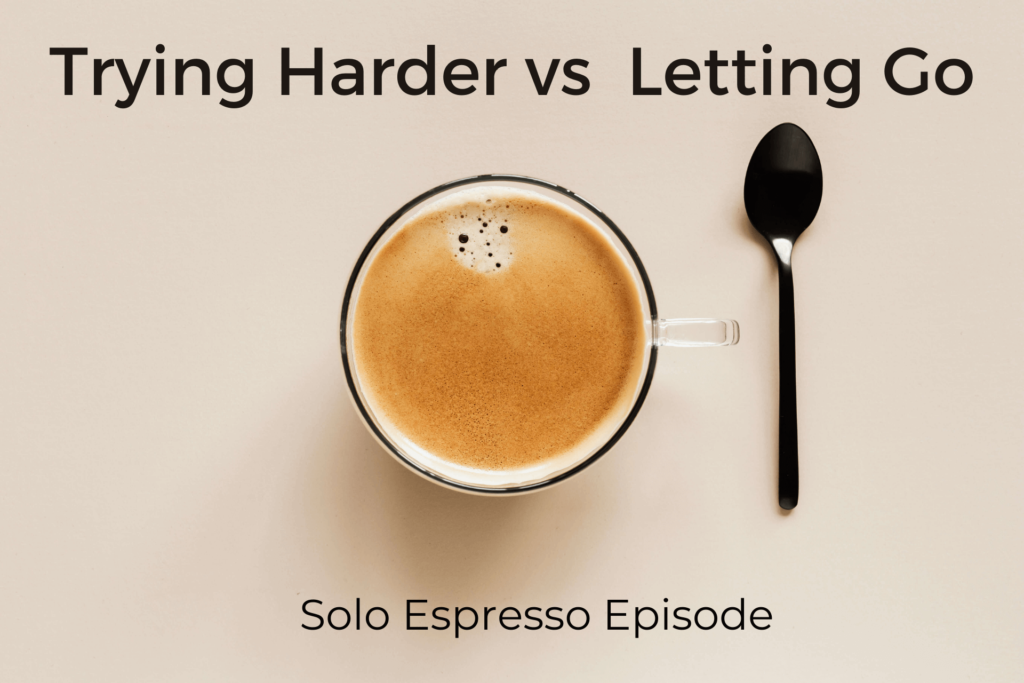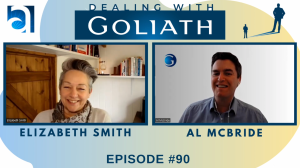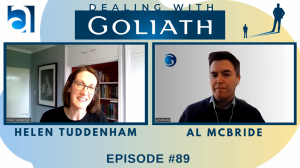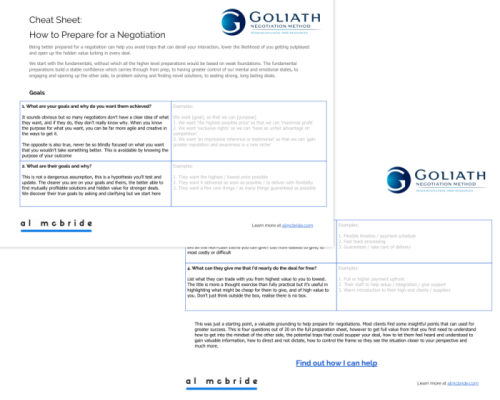Show Notes:
Trying hard, working hard, acting with perseverance have obvious benefits. That Protestant work ethic, as Niall Ferguson suggested, was key to the western hemisphere’s unlikely dominance over much of the world for hundreds of years.
But as Aristotle said, “every virtue carried to the extreme is a vice”. Here Alistair explores the limits of mindlessly grinding ahead and seeking balance to the grind instead.
- Niall Ferguson; work and getting rewards for your labour
- Aristotle and balance
-
The movement against the grind
-
The benefits and downside of grit
-
‘Whacking the TV’ approach to problem solving
-
Billions spent on attention theft
- You can’t sleep or meditator ‘harder’
- Emotionally non-reactive, yet fully present
- Building trust into profit
- Relax so you don’t miss the opportunities
Transcript
Al McBride 0:03
Welcome to the dealing with Goliath podcast. This is a solo espresso episode that I call, trying harder versus letting go sleep meditation and remembering.
Al McBride 0:36
So this is something that comes up quite a lot that in my work that I see that I do as well. But also I see in a lot of clients and a lot of colleagues and friends, is this sort of relentless struggle, being relentless, can be a very good thing.
Al McBride 0:54
This work ethic, or as historian and economist Niall Ferguson called the Protestant work ethic as it’s known, he said, It was one of the key factors that gave the West the edge in global power and politics for hundreds of years. And he might be right.
Al McBride 1:14
He might be right. It’s this idea that you can work hard and get your just rewards, which wasn’t possible in a lot of societies until fairly recently you have to remember, but it was a bit more in the early United States. And then to a lesser extent, Britain, and Germany and France and whatnot, in the early industrial powers, you could work your way up that kind of idea.
Al McBride 1:39
This work ethic, this feeling of grind, and perseverance is very much still seen as a virtue and no, I’m not saying it’s not. But what I’m bringing maybe my attention to here is what Aristotle said. Aristotle said, Every virtue carried to the extreme is a vice.
Al McBride 2:02
I love that it’s this idea that things have to be in balance. So anything over under done can be quite harmful instead of being a benefit. That there’s a movement against it, there’s a movement for that balance against just that grinding work.
Al McBride 2:21
Things like the four hour workweek. Tim Ferriss, of course, is one of the famous ones, which of course, is ironically hugely popular with a lot of IT people in Silicon Valley, people who work 60 to 80 hour weeks. Because the title really should have been the four hour grunt work week.
Al McBride 2:40
But he’s a great marketer, so that that was never going to fly. But that’s really the idea that you know, reduce the work that you find unpleasant to an absolute minimum. And that frees up your time to do work where you add the most value.
Al McBride 2:54
So it’s a little bit working smarter than working harder. And I’m going to do another episode, shortly on that idea of working smarter versus working harder and what that is, but I digress, the whole point is is about effectiveness, efficiency, and not just blindly grinding ahead on what’s just in front of you. This is for me the difference because Angela Duckworth defines grit.
Al McBride 3:26
She defines grit to this positive psychology professor. She wrote a great book called grit and did not it did a ton of research on gripping one of the most important factors in anyone’s success. And she defines grit, as passion and sustained persistence applied toward long term achievement, with no particular concern for awards, or recognition along the way.
Al McBride 3:54
As you can imagine, again, it’s not rocket science, why that could be a distinct advantage of a virtue or characteristic for you to, to learn or to exhibit, okay? Not saying that’s a problem, I’m just saying it needs balance with the other side. So for my point is, you know, in the industrial revolution, back in the day, there was very much more space for just grinding a hand with things, just putting in more hours, working harder, more sweat into the thing, and you’re gonna get probably more results, whereas nowadays that just doesn’t work.
Al McBride 4:35
You need more, you need something else, you know, in the 21st century, shouldn’t be so much about grinding, it should be more shouldn’t be so much about forcing something, or as we say in Ireland, using brute force an ignorance like hitting a television, you know, that’s on the blink that is a problem with the picture.
Al McBride 4:54
Some people go over and hit the TV, you know, as if this is going to the problem, you know, just bash it you know, the harder you hit is approach to problem solving. Not sure how effective that is, don’t get me wrong, I keep saying sometimes Yes, you do have to, you know, put the show over in, grind through it persevere.
Al McBride 5:16
And you’ll get your just rewards, of course you will. But there’s a lot more areas these days, where you need a lot of thinking work, creative work, and particularly innovative work, where you can’t just grind through it.
Al McBride 5:30
It’s not so much grinding as hard work or trying hard, so much as focus, focusing your time, your mind. And of course, your attention. And this is very much the attention economy these days, this is what billions have been spent on by using some of the greatest, brightest minds on the planet, with the sole goal of stealing your attention to something that you weren’t planning to give attention to.
Al McBride 5:59
But anyway, that’s a whole other talk. But I digress. It’s about focus, not force. So it’s not about forcing, it’s about focusing. And think of it this way is a lovely parallel with with sleep, you can’t force you can try and sleep harder, like as if that will get you to the goal of being asleep or getting quality sleep.
Al McBride 6:23
Much like meditation, you can’t meditate hard, it can’t focus, I will aggressively focus harder, no, it’s the opposite, you have to let go of those tensions. And to get to that state of being either entering into sleep, or entering into that alpha brain state, which is meditation, or much, much of it is meditation.
Al McBride 6:48
Again, that’s a good point to do a whole episode on those two, you can’t force these things, you have to fall back into them, you have to relax, be fully present with whatever state you want to be in or in that transition. And then almost fall back end, you can force us. So you need to be fully focused, but relaxed.
Al McBride 7:14
This is a parallel here. With the Goliath Negotiation Method, some of the stuff that I do clients, you know, it’s sometimes it’s about letting go of that tension, that desire to control, like the sleep and the focus and swapping it for just being present and focused.
Al McBride 7:34
You need to be fully focused, but relaxed, and that relaxed state is key, not carrying too much tension. That’s when you can flow with what’s happening. You can be creative, you can, okay sometimes be reactive, but then proactive again. And I don’t just mean that as a business buzzword. Proactive means that you’re actually seeking out conscious action. So it is quite a good word, not merely reacting to the state of others.
Al McBride 8:04
This is similar idea that you don’t have to dictate or force your point of view, on the other side that often has that complete opposite effect to what’s desired. And it’s a bit like a previous podcast solo episode I did there on Bismarck. The Bismarck quote, “one can control the current of events, you can only get on and float and steer”.
Al McBride 8:30
The point is that I help my clients to be fully present. So they’re fully there, emotionally non reactive. So whatever emotional games the other side are playing, which is something most negotiation training courses doesn’t really dive into very much.
Al McBride 8:52
But being emotionally present nonreactive but able to then adjust and adapt fully with all of the creative abilities that you have. So you, as I say, are directing, not dictating. This means that you tend to get a huge amount more information out of the other side, they’re doing the majority of the talking.
Al McBride 9:16
So you get valuable information. They feel fully heard and fully understood particularly as when you’re fully present you’re then able to mirror and shadow them back as to exactly that you’re on the same page as they are that they’re clear that you understand their perspective, they feel fully heard, which is huge for building trust.
Al McBride 9:41
With that information creates much greater value in relationships. And in making deals and like I mentioned before, trust, when it’s high trust in deals and arrangements, there’s usually 30% or more value created and when there’s normal or lower levels. Trust.
Al McBride 10:01
This idea is very important this idea of, yes, working hard, trying hard, but more so the underlying factor is being focused, rather than just grinding and grunting through it. There’s a great phrase that Chris Voss used.
Al McBride 10:18
I don’t know if he originally maybe missed your time. But you know, never be so fixated on what you want that you won’t take something better. When someone has that, where even though you’re explaining like this does what you ask, but does it better and cheaper and it’s better in every way? Oh, no, I want the other thing. That’s exactly the point. They’re too tense to see that opportunity they’re too tunnel visioned. And by being able to relax back into that relaxed, alert state, you can be far far more effective.
Transcribed by https://otter.ai




